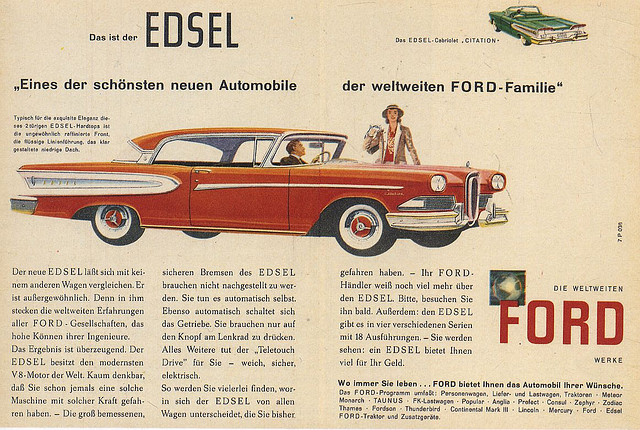Lee Iacocca: Rewind If The Product Sucks
 In 1956, Ford Motor Company went public and Iacocca wanted to compete directly with GM’s Cadillac. So, the Ford Edsel (named after Henry Ford’s son) was released with much fanfare. But it was remarkably unsuccessful. The production costs were set in motion long in advance and the car was released on schedule. Unfortunately, sales for the Edsel were dismal at a price tag of $3,500 – $3,766. It was an ugly car that had a strange looking front. Ford lost $350 million on the production while only 119,287 Edsel’s were actually built. An additional problem was that the Edsel competed on price against its own sister divisions within Ford. The Edsel had been priced as high as a Mercury $4,280 – $4,405. Also, there was a recession in 1957. McNamara pushed for the closure of production for the Edsel in light of these facts…
In 1956, Ford Motor Company went public and Iacocca wanted to compete directly with GM’s Cadillac. So, the Ford Edsel (named after Henry Ford’s son) was released with much fanfare. But it was remarkably unsuccessful. The production costs were set in motion long in advance and the car was released on schedule. Unfortunately, sales for the Edsel were dismal at a price tag of $3,500 – $3,766. It was an ugly car that had a strange looking front. Ford lost $350 million on the production while only 119,287 Edsel’s were actually built. An additional problem was that the Edsel competed on price against its own sister divisions within Ford. The Edsel had been priced as high as a Mercury $4,280 – $4,405. Also, there was a recession in 1957. McNamara pushed for the closure of production for the Edsel in light of these facts…
 Iacocca learnt from the Edsel errors. The 1960s represented youth with Kennedy in the White House. As the head of the Ford division, Lee shut down the Cardinal project, which was McNamara’s brainchild after Falcon. Again this car was utilitarian, cheap, fuel efficient and well built. It was also boring and built, designed and tested in Germany. Ford projected 300,000 units for the Cardinal but in the US market it was hard to imagine that it would work. The car was too ahead of its time so Iacocca advocated scrapping the Cardinal even though it cost $35 million to produce at the stage Iacocca had it shutdown. This was after McNamara had left to be Secretary of Defense under the Kennedy administration.
Iacocca learnt from the Edsel errors. The 1960s represented youth with Kennedy in the White House. As the head of the Ford division, Lee shut down the Cardinal project, which was McNamara’s brainchild after Falcon. Again this car was utilitarian, cheap, fuel efficient and well built. It was also boring and built, designed and tested in Germany. Ford projected 300,000 units for the Cardinal but in the US market it was hard to imagine that it would work. The car was too ahead of its time so Iacocca advocated scrapping the Cardinal even though it cost $35 million to produce at the stage Iacocca had it shutdown. This was after McNamara had left to be Secretary of Defense under the Kennedy administration.
 This is a synopsis & analysis based on Iacocca: An Autobiography and other miscellaneous research sources. Enjoy.
This is a synopsis & analysis based on Iacocca: An Autobiography and other miscellaneous research sources. Enjoy.
Margaret Thatcher on the Urban Riots of 1981
Ethnic minorities – who were upset about racial profiling, the strains of immigration, relocation of housing into state controlled residential zones and cultural clashing – rioted through the summer of 1981. Thatcher resolved to protect the police at all costs. Her concern was centrally on police equipment and protection. Brixton was the centre of this violence. She rbelives that these people were lazy and had not taken ownership of their own lives having been dependent a state socialism. Thatcher resolved to provide programs in her 2nd and 3rd terms but recognized soccer hooliganism was an increased trend in the past few decades.
Moog Moog Moog
Hey guys, check out this old Moog tech.

